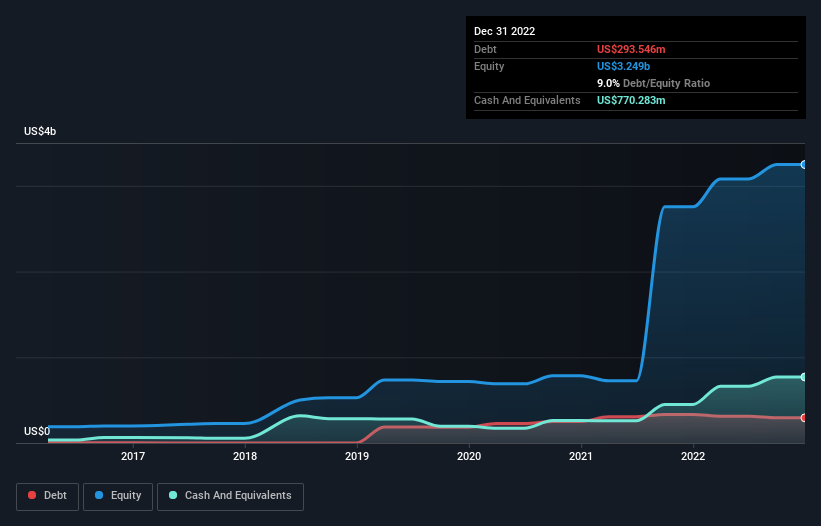
Legendary fund manager Li Lu (who Charlie Munger backed) once said, 'The biggest investment risk is not the volatility of prices, but whether you will suffer a permanent loss of capital.' So it might be obvious that you need to consider debt, when you think about how risky any given stock is, because too much debt can sink a company. We can see that Allkem Limited (ASX:AKE) does use debt in its business. But should shareholders be worried about its use of debt?
Why Does Debt Bring Risk?
Debt assists a business until the business has trouble paying it off, either with new capital or with free cash flow. Part and parcel of capitalism is the process of 'creative destruction' where failed businesses are mercilessly liquidated by their bankers. However, a more usual (but still expensive) situation is where a company must dilute shareholders at a cheap share price simply to get debt under control. Of course, the upside of debt is that it often represents cheap capital, especially when it replaces dilution in a company with the ability to reinvest at high rates of return. When we think about a company's use of debt, we first look at cash and debt together.
Check out our latest analysis for Allkem
How Much Debt Does Allkem Carry?
You can click the graphic below for the historical numbers, but it shows that Allkem had US$293.5m of debt in December 2022, down from US$333.5m, one year before. But on the other hand it also has US$770.3m in cash, leading to a US$476.7m net cash position.

A Look At Allkem's Liabilities
Zooming in on the latest balance sheet data, we can see that Allkem had liabilities of US$334.2m due within 12 months and liabilities of US$1.24b due beyond that. On the other hand, it had cash of US$770.3m and US$59.3m worth of receivables due within a year. So its liabilities outweigh the sum of its cash and (near-term) receivables by US$743.7m.
Given Allkem has a market capitalization of US$4.28b, it's hard to believe these liabilities pose much threat. However, we do think it is worth keeping an eye on its balance sheet strength, as it may change over time. Despite its noteworthy liabilities, Allkem boasts net cash, so it's fair to say it does not have a heavy debt load!
Better yet, Allkem grew its EBIT by 987% last year, which is an impressive improvement. If maintained that growth will make the debt even more manageable in the years ahead. When analysing debt levels, the balance sheet is the obvious place to start. But ultimately the future profitability of the business will decide if Allkem can strengthen its balance sheet over time. So if you want to see what the professionals think, you might find this free report on analyst profit forecasts to be interesting.
Finally, a company can only pay off debt with cold hard cash, not accounting profits. Allkem may have net cash on the balance sheet, but it is still interesting to look at how well the business converts its earnings before interest and tax (EBIT) to free cash flow, because that will influence both its need for, and its capacity to manage debt. Looking at the most recent two years, Allkem recorded free cash flow of 35% of its EBIT, which is weaker than we'd expect. That weak cash conversion makes it more difficult to handle indebtedness.
Summing Up
While Allkem does have more liabilities than liquid assets, it also has net cash of US$476.7m. And we liked the look of last year's 987% year-on-year EBIT growth. So we don't think Allkem's use of debt is risky. We'd be motivated to research the stock further if we found out that Allkem insiders have bought shares recently. If you would too, then you're in luck, since today we're sharing our list of reported insider transactions for free.
At the end of the day, it's often better to focus on companies that are free from net debt. You can access our special list of such companies (all with a track record of profit growth). It's free.
New: Manage All Your Stock Portfolios in One Place
We've created the ultimate portfolio companion for stock investors, and it's free.
• Connect an unlimited number of Portfolios and see your total in one currency
• Be alerted to new Warning Signs or Risks via email or mobile
• Track the Fair Value of your stocks
Have feedback on this article? Concerned about the content? Get in touch with us directly. Alternatively, email editorial-team (at) simplywallst.com.
This article by Simply Wall St is general in nature. We provide commentary based on historical data and analyst forecasts only using an unbiased methodology and our articles are not intended to be financial advice. It does not constitute a recommendation to buy or sell any stock, and does not take account of your objectives, or your financial situation. We aim to bring you long-term focused analysis driven by fundamental data. Note that our analysis may not factor in the latest price-sensitive company announcements or qualitative material. Simply Wall St has no position in any stocks mentioned.
About ASX:AKE
Allkem
Allkem Limited engages in the production and sale of lithium and boron in Argentina.
Undervalued with adequate balance sheet.
Similar Companies
Market Insights
Community Narratives





